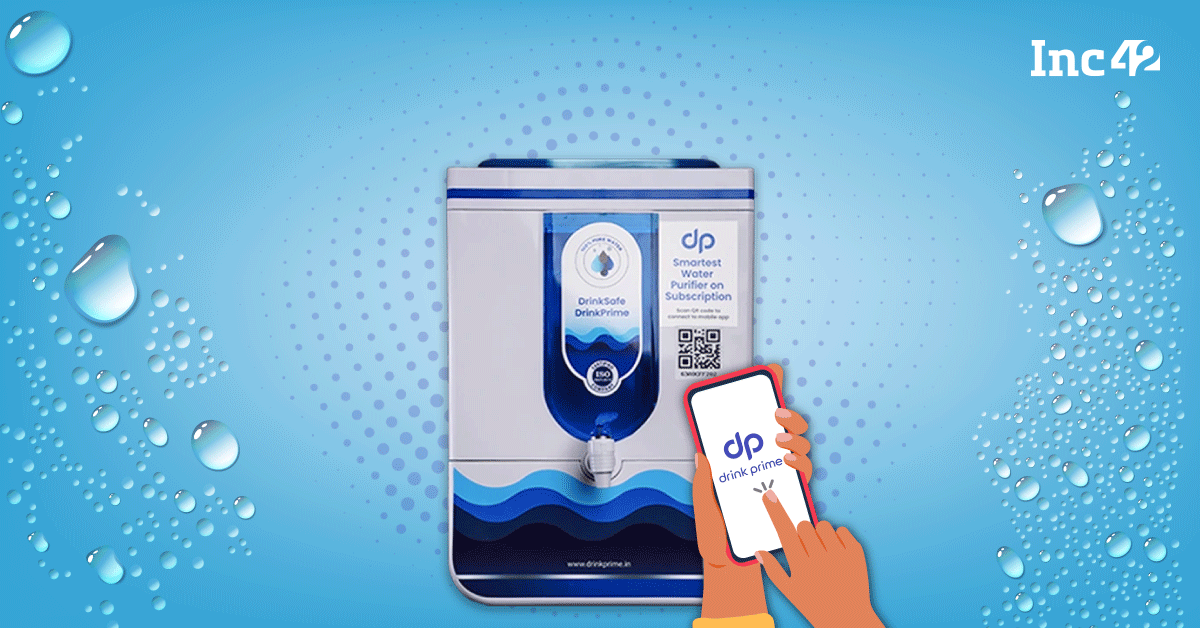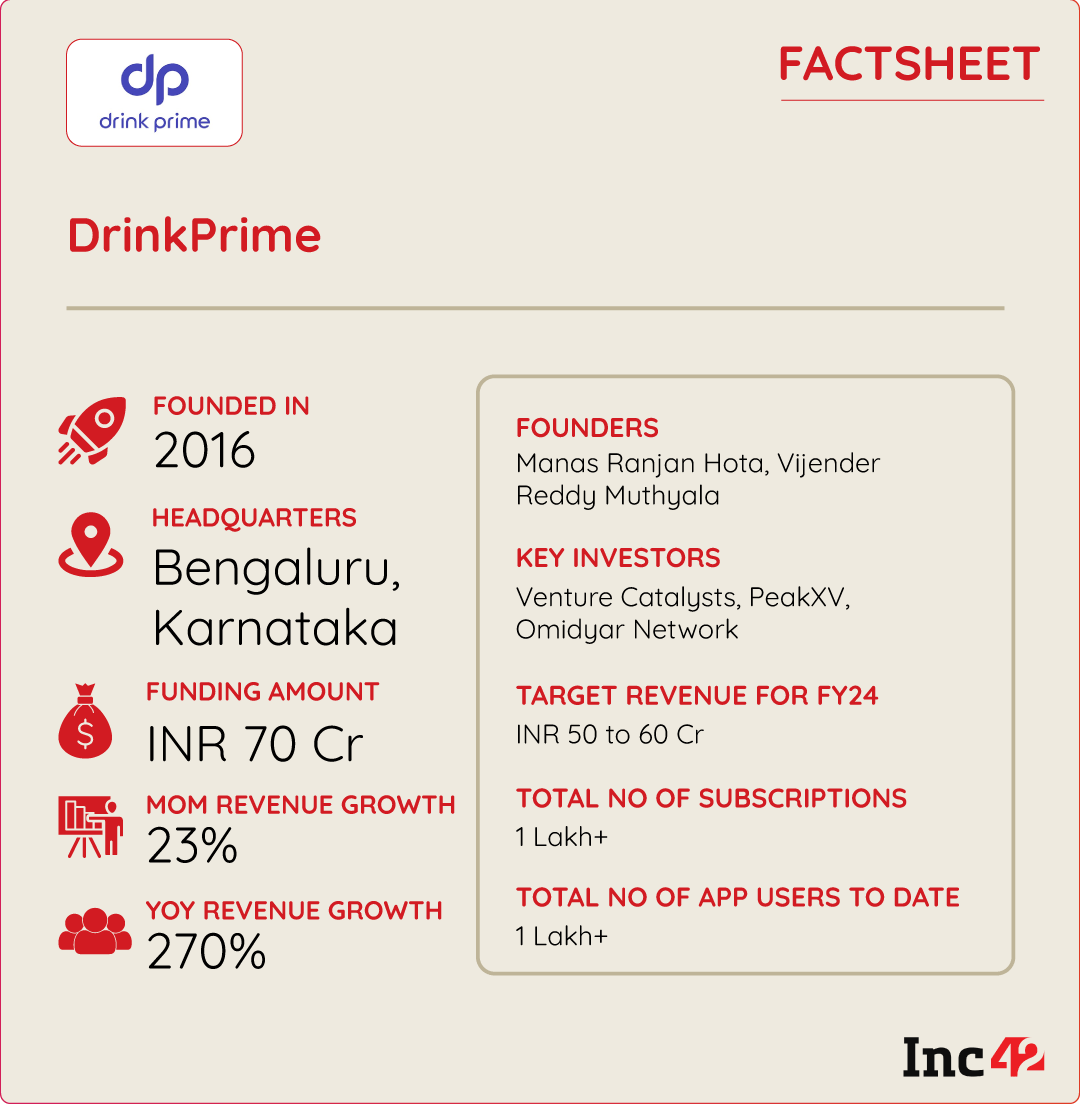Startup Stories
Here’s How DrinkPrime Is Quenching The Thirst Of Indians For Safe Drinking Water

[ad_1]
Founded in 2016, DrinkPrime provides subscription-based water purification services to Indian households starting at INR 333 a month
Since its inception, the startup has raised more than INR 70 Cr from the likes of Venture Catalysts PeakXV and Omidyar Network
Today, the founders claim to be EBITDA positive, with the startup catering to more than 1 Lakh Indian households, several hospitals, corporations and schools.
It’s not every day that one gets to listen to the stories of entrepreneurs who carved a niche for themselves in a sector highly dominated by either unorganised or legacy giants. Well, the entrepreneurial journey of Vijender Reddy Muthyala and Manas Ranjan Hota, the founders of Bengaluru-based watertech startup, DrinkPrime starts with a similar hook and an epiphany, of course, one of the most common ingredients in the story of any entrepreneur.
Founded in 2016, DrinkPrime provides subscription-based water purification services to Indian households at costs as low as INR 333 a month, installation and maintenance included. The startup’s RO machines come loaded with IoT tech and are customised to cater to the water purification needs of families living in different localities.
Since its inception, the startup has raised more than INR 70 Cr from the likes of Venture Catalysts, PeakXV and Omidyar Network which reflects investors’ trust in the founders’ business model.
Interestingly, had it not been for the water-scarce city of Bengaluru and their daily struggle to find safe drinking water, Muthyala would still be working as a software developer and Hota as a marketing professional. But destiny had different plans for them.
The story of the duo’s entrepreneurial journey starts with their heavy reliance on plastic drinking water cans. While they were not alone in lamenting about the quality of water they had been exposing their bodies to for quite a long time, they were surely the ones who stood up to bring about change.

The Genesis Of DrinkPrime
Interestingly, DrinkPrime did not come into existence right away. Before its launch, the founders floated an app, Waterwala, to deliver drinking water cans to people. This small-time gig helped the founders study the market closely and comprehend what had yet to be done in a bid to provide access to safe drinking water to families.
But much had yet to be done, as the idea of a more scalable solution to address this challenge kept them awake at night. However, much to everyone’s chagrin, the issue was grimmer than the founders’ anticipation. This is because the water quality varied area-wise, which also meant different contamination levels to deal with and the one-size-fits-all approach would hardly be of any value if they truly wanted to bring change.
The duo then decided to offer subscription-based customisable water purifiers, leading to the incorporation of DrinkPrime. But as they were still in their nascent stages, they knew that investor funding was not an option for them at the outset.
Therefore, as they say, “Innovation is the hallmark of entrepreneurship,” the founders got into revenue-sharing agreements with water purifier manufacturers.
Under this regime, the duo saved themselves from incurring upfront manufacturing costs, a strategy that worked as a major growth catalyst for their newly formed venture.
Today, the founders claim to be EBITDA positive, with the startup catering to more than 1 Lakh Indian households, several hospitals, corporations and schools like Government Higher Primary School, Bidaraguppe, YMC Kayaking Training Centre and Government Lower Primary School, Suggatta.
“We found that many brands used technical terms and technicalities of water purifiers to sell their purifiers, which confuses buyers. But we kept it simple. Our marketing has been all about promising safe drinking water,” Hota said, underlining the core principle of DrinkPrime’s marketing strategy that has helped the startup scale so far.
DrinkPrime’s Hi-Tech Water
The startup’s water purifiers not only offer a seven-stage filtration process but also come with several tech-loaded features. DrinkPrime claims to reduce germs in drinking water while preserving essential minerals. Users can also monitor water quality with the help of the DrinkPrime app.
DrinkPrime’s purifiers are IoT-enabled and employ data analytics to continuously monitor and maintain water quality, all while enhancing user experience. The startup gathers water quality data on parameters like pH levels, total dissolved solids (TDS) and water hardness from different areas. This helps the startup understand the specific purification needs of each area.
The startup’s mobile app is a significant part of its service, as it simplifies the process of renting and managing water purifiers. The app allows users to recharge purifiers, track water usage, and renew or cancel subscription plans. It also enables direct communication with the support team, ensuring users receive prompt free-of-cost assistance.
DrinkPrime also uses analytics to gain insights into improving services and maintaining water quality. It incorporates customer feedback around the clock to improve its services.
Meanwhile, on the support end, DrinkPrime has employed a ticketing system. Subscribers raise inquiries or concerns on the app, enabling its support team to respond swiftly.
Providing Access To Affordable Clean & Safe Drinking Water
DrinkPrime’s value proposition lies in its pricing strategy. It offers purified water with zero purchase, installation and maintenance costs. In contrast, other similar-quality purifiers can cost more than INR 20K, excluding installation and annual maintenance between INR 4K and 5K.
According to the founders, DrinkPrime stands out as the more affordable choice for users, as the company does not charge even a single penny over and above its subscription cost.
“We have crafted well-researched subscription models under which users pay as per their consumption needs. For instance, solo consumers can take a yearly subscription for INR 4K, giving access to 1,500 L of purified water. While a family of more than four can opt for the unlimited supply of purified water for INR 6,400 L,” Hota said, adding that the startup currently has four subscription plans in place.
DrinkPrime’s Future Roadmap
The founders told Inc42 that they approached Venture Catalysts in 2022, as the investment firm has a proven track record of supporting successful companies.
“The investors liked our business model and went beyond offering just financial aid. The mentorship and strategic insights have helped us sharpen our business strategies and effectively navigate challenges,” the founders said.
With the ongoing support from Venture Catalysts, the founders plan to expand their footprint to new geographies. Currently operational in seven cities, including Delhi-NCR, Mumbai and Bengaluru, the startup is also running a CSR campaign, #DonatewithDrinkPrime, under which it is providing safe drinking water to over 750 students in Bengaluru’s government schools.
“Moreover, we plan to diversify our offerings to cater to a broader audience,” said Hota. To do this the founders said that they aim to launch water purifiers that could dispense sparkling water or get you a glass of water as per your desired temperature. In the near term, the startup also plans to offer vitamin and protein-based drinks.
According to the founders, this is the right time to make waves in the industry as the investor sentiment is currently ripe towards the Indian water tech space, with quite noteworthy innovation happening in the sector.
It is pertinent to mention that DrinkPrime competes with the likes of Swajal, OwO, OCEO, Livpure, et al. to tackle the challenge of water contamination across India.
“Investors recognise the potential for innovation in addressing this widespread issue. They understand that the major growth drivers for this sector are tech innovations and people’s growing awareness of having access to clean and drinking water, which is also increasingly becoming a basic human need,” the founders said, adding that only 10% of Indians today have access to water purifiers, which makes for a huge white space to be filled in a country where clean drinking water is just another pressing issue.
According to a 2021 report, freshwater resources, vital for the survival of humans, are deteriorating rapidly due to increasing pollution and contamination and disappearing at an alarming rate due to human interventions. Not just this, waterborne diseases affect millions annually, causing serious illness and even death.
Another report, published by the Telegraph in 2022, highlighted the Centre for Science and Environment (CSE) data, which revealed concerning levels of at least one heavy metal that is deemed toxic to human health in the waters of 117 rivers of India.
In the larger scheme of things, startups like DrinkPrime, incorporated to solve real-world problems, seem well-poised to grow in the long run. Some of the factors that will play a crucial role in their success will be investors’ trust, cheaper solutions, and tech innovation.
In addition, other things that constantly peeved the two were inconsistent deliveries, unhygienic containers and unreliable water suppliers – and this was besides the questionable water quality that they, and many others like them, were exposed to.
The household drinking water segment was crying a disruption — for there wasn’t even a single startup that was offering access to safe and affordable clean water solutions to the masses back in 2016 , the founders reminisced.
“This got us thinking about how to eliminate the reliance on harmful plastic cans for drinking water, which usually remain exposed to the Sun, resulting in water getting contaminated with microplastics,” Hota said.
That was the time when the duo decided to get their hands dirty and synergised to provide safe drinking water to families heavily reliant on plastic cans. According to the cofounders, at the time when they were still fidgeting with the idea of floating their startup, less than 10% of Indians owned water purifiers.
At this first beacon of opportunity, the duo decided to take the leap of entrepreneurial faith, committed to the intent of providing safe drinking water to many like them.
[ad_2]
Source link
Startup Stories
Byju’s partially pays March salaries, pending February payouts.

Byju’s, a prominent player in the edtech industry, has encountered financial challenges resulting in delayed salary payments for its employees. As of April 20, the company has only disbursed a portion of March salaries, attributing the delay to a severe cash crunch. Despite earlier assurances from the company’s management that salaries for March would be paid by April 18, many mid-senior employees have reported receiving only 50% of their March salaries. Additionally, February salaries remain unpaid for a significant number of employees, further exacerbating the situation.
Founder and CEO, Byju Raveendran, has resorted to raising personal debt against his stakes in the company to facilitate salary payments. This underscores the severity of the financial challenges facing Byju’s and highlights the lengths to which Raveendran is willing to go to address the issue.
Employee testimonies reveal the extent of the salary delays, with one employee stating that they received only 50% of their March salary on April 20, with 80% of their February salary still pending. Another concerning aspect is the reported disparity between junior and senior employees, with junior staff receiving full salary payments while top management has gone without salaries for the past two months.
Byju’s has acknowledged the delay in salary payments but has not provided a detailed explanation for the situation. A company spokesperson declined to comment on queries from ET regarding the matter. In an email sent to employees on April 8, the management team expressed regret over the delay and attributed it to the inability to secure approval to access funds from a rights issue. The delay has been further compounded by actions from foreign investors, hindering the company’s access to necessary funds.
This revelation follows a previous report by ET on April 1, which highlighted Byju’s decision to delay salary payments due to constraints imposed by warring investors, limiting the company’s access to funds through a rights issue. The ongoing dispute with investors, including Dutch investor Prosus, has added to Byju’s financial woes and has led to further delays in resolving the issue.
In a separate development, Byju’s India chief executive, Arjun Mohan, announced his departure from the company in mid-April, just six months after assuming the role. This unexpected move prompted founder Byju Raveendran to take on the responsibility of overseeing day-to-day operations of the company’s India business, housed under Think & Learn, marking a significant shift in leadership.
Amidst these challenges, Byju’s is embroiled in a legal battle with a group of investors led by Prosus, who are seeking to block a rights issue and the removal of Byju Raveendran as CEO. The company has also initiated arbitration proceedings to address the dispute and find a resolution.
The rights issue undertaken by Byju’s is significant, as it is being offered at a staggering 99% discount to the company’s peak valuation of $22 billion. This steep discount has implications for investors who choose not to participate in the funding, potentially resulting in a significant dilution of their shareholding post-completion of the rights issue.
The unfolding events at Byju’s underscore the challenges facing the edtech giant as it navigates financial constraints, leadership transitions, and legal disputes. The company’s ability to address these issues effectively will determine its future trajectory and its ability to maintain its position in the competitive edtech landscape.
Startup Stories
Revolut India receives provisional approval for PPI license from RBI

Revolut India, a neobank backed by Tiger Global and Softbank, has secured an in-principle approval from the Reserve Bank of India (RBI) for issuing Prepaid Payment Instruments (PPI), encompassing prepaid cards and wallets. CEO Paroma Chatterjee shared this development in a LinkedIn post on Friday. This approval complements Revolut India’s existing licenses from the RBI, which allow it to function as a Category-II Authorised Money Exchange Dealer (AD II), enabling the issuance of multi-currency forex cards and cross-border remittance services.
Chatterjee emphasized the significance of this milestone, highlighting the opportunity it presents to provide Indian consumers with both international and domestic payment solutions on a unified platform. Revolut, Europe’s largest neobank, entered the Indian market in 2021 with aspirations to disrupt the domestic payments sector. The RBI’s approval is expected to bolster Revolut’s position as a key player in this domain.
Prepaid Payment Instruments (PPIs) are payment tools that utilize stored monetary value, including digital wallets, smart cards, or vouchers, for transactions. RBI Governor Shaktikanta Das proposed on April 5, 2024, to allow PPIs to be linked through third-party UPI applications, enabling PPI holders to conduct UPI payments akin to bank account holders.
Chatterjee underscored Revolut’s commitment to full compliance with regulatory requirements, particularly in India, where the neobank has undertaken significant efforts to localize its global tech-stack to adhere to local regulations.
In an interview with ET BFSI, Chatterjee disclosed Revolut’s plans to introduce a comprehensive suite of digital-first money management services for all Indian customers. These services will enable users to manage their finances, including payments and remittances, both domestically and internationally.
The app, currently in use by employees, will be officially launched once the internal testing phase is completed, according to Chatterjee. She also revealed that there are over 175,000 prospective customers on Revolut India’s waitlist, indicating strong interest in the product.
Startup Stories
Postman buys Orbit to extend developer community reach.

Postman, renowned as an API management platform tailored for enterprises, has recently made headlines with its acquisition of Orbit, a pivotal tool in the arsenal of developer companies for nurturing communities across a spectrum of platforms, including Discord, Slack, and GitHub. Although the specifics of the financial transaction remain undisclosed, Postman took to its blog to underline Orbit’s indispensable role in supporting major developer companies in fostering community management and fostering growth over the course of the past four years.
Within the ecosystem of Postman, the integration of Orbit is poised to be transformative, with the Orbit team set to assume a pivotal role in seamlessly embedding community-centric features into the fabric of the Postman Public API Network. This strategic move is aimed at catalyzing dynamic collaboration between content creators and end-users within the network. Postman, boasting a staggering valuation of $5.6 billion, stands as a stalwart in the realm of API collaboration platforms, serving a user base exceeding 30 million developers and 500,000 organizations.
Under the stewardship of Noah Schwartz, a recent addition to the Postman team hailing from Amazon Web Services, the Orbit team is primed to spearhead initiatives aimed at empowering API distributors to broaden the horizons of their communities, optimize API utilization, and solicit direct feedback from users entrenched within the network.
This integration is anticipated to embolden developers to unearth APIs tailored to their unique requirements and foster meaningful engagements with peers to extract maximum value from each API. However, as part of the transitionary phase, Orbit has outlined plans to gradually phase out its existing product and platform over the span of the next 90 days. Commencing July 11, all functionalities will be deactivated, with no provision for the creation of new users or workspaces.
Postman’s strategic maneuver comes on the heels of its triumphant fundraising endeavor in 2021, securing a whopping $225 million in funding. The fundraising round, spearheaded by Insight Partners, witnessed active participation from prominent entities such as Coatue, Bond Capital (helmed by Mary Meeker), and Battery Ventures.
-

 Startup Stories1 year ago
Startup Stories1 year agoWhy Millennials, GenZs Are Riding The Investment Tech Wave In India
-

 Startup Stories1 year ago
Startup Stories1 year agoStartups That Caught Our Eyes In September 2023
-

 Startup Stories1 year ago
Startup Stories1 year agoHow Raaho Is Using Tech To Transform India’s Fragmented Commercial Trucking
-

 Startup Stories1 year ago
Startup Stories1 year agoMeet The 10 Indian Startup Gems In The Indian Jewellery Industry’s Crown
-

 Startup Stories1 year ago
Startup Stories1 year agoWOW Skin Science’s Blueprint For Breaking Through In The $783 Bn BPC Segment
-

 Crptocurrency12 months ago
Crptocurrency12 months agoLither is Making Crypto Safe, Fun, and Profitable for Everyone!
-

 Startup Stories1 year ago
Startup Stories1 year agoHow Volt Money Is Unlocking The Value Of Mutual Funds With Secured Lending
-

 Startup Stories1 year ago
Startup Stories1 year agoWhy Moscow-Based Kladana Considers Indian SME Sector As The Next Big Market For Cloud Computing




